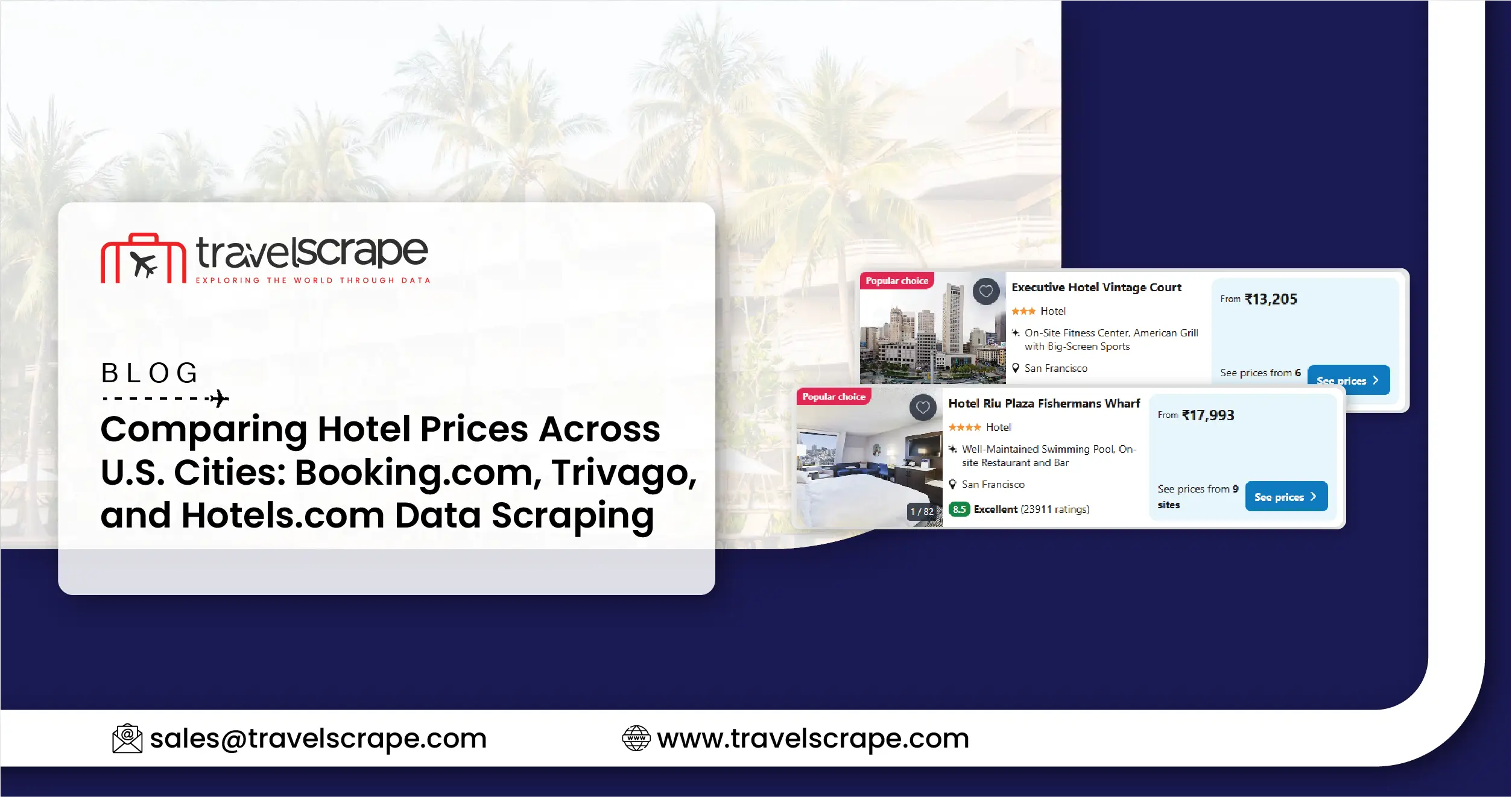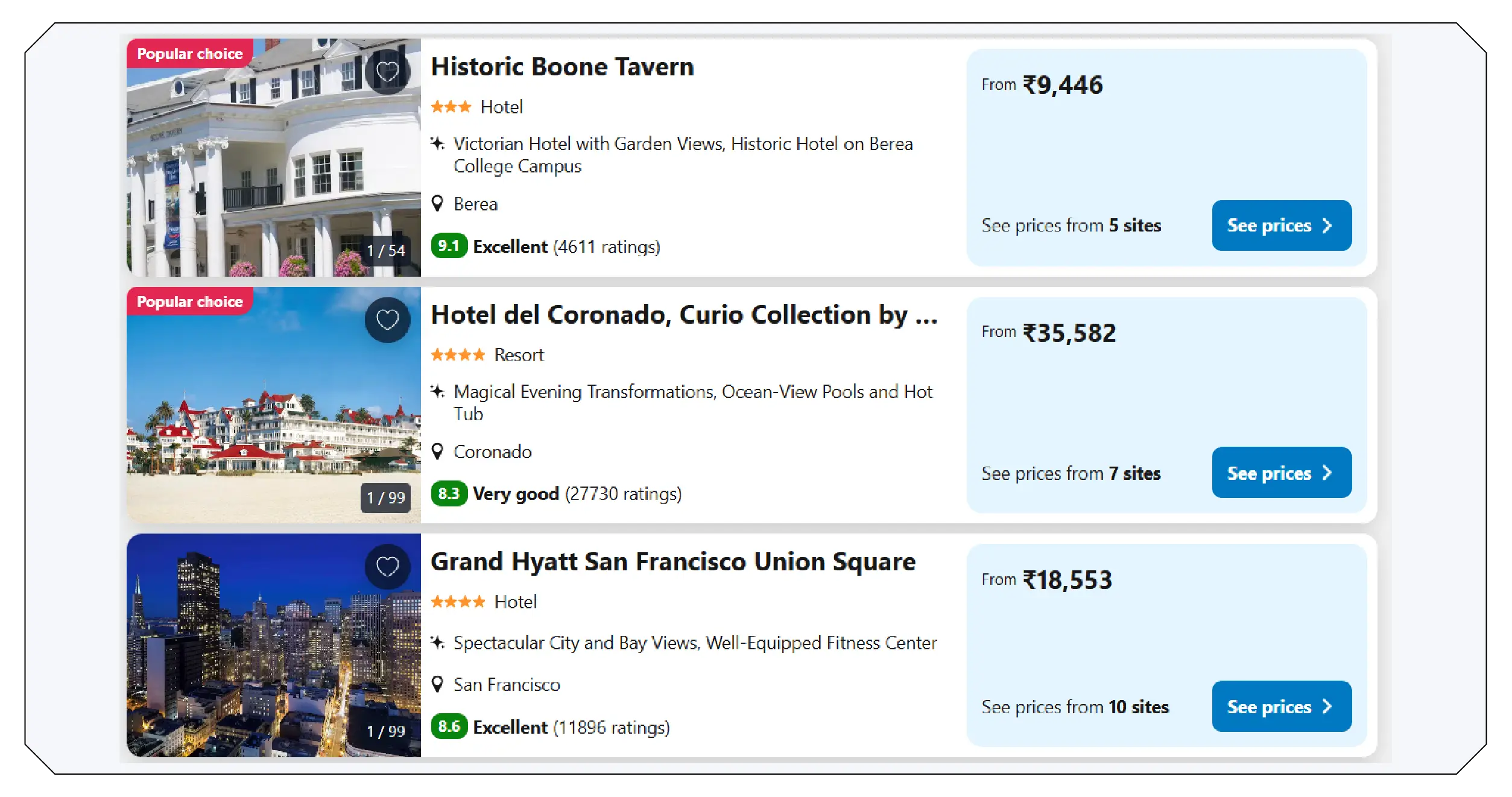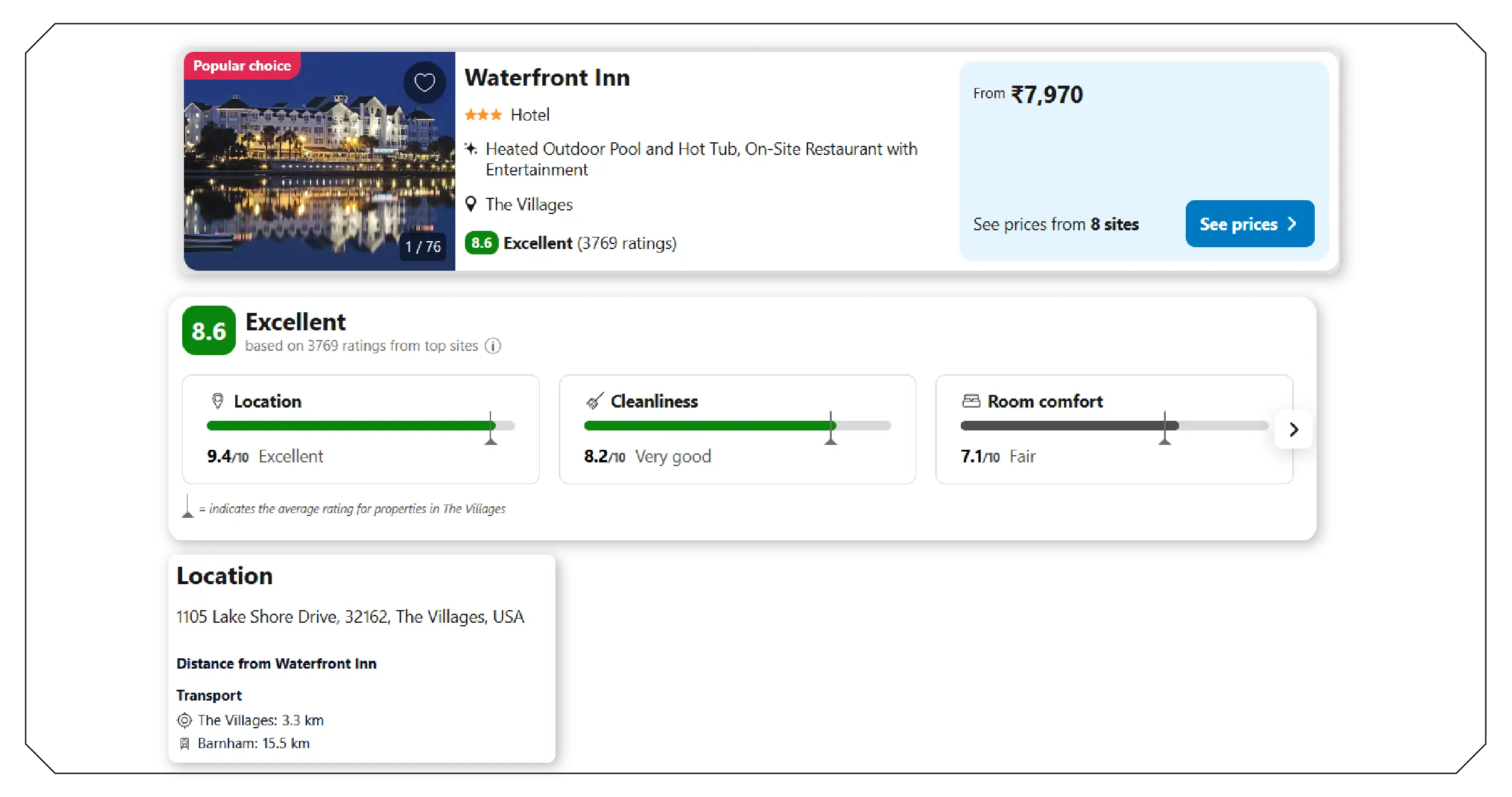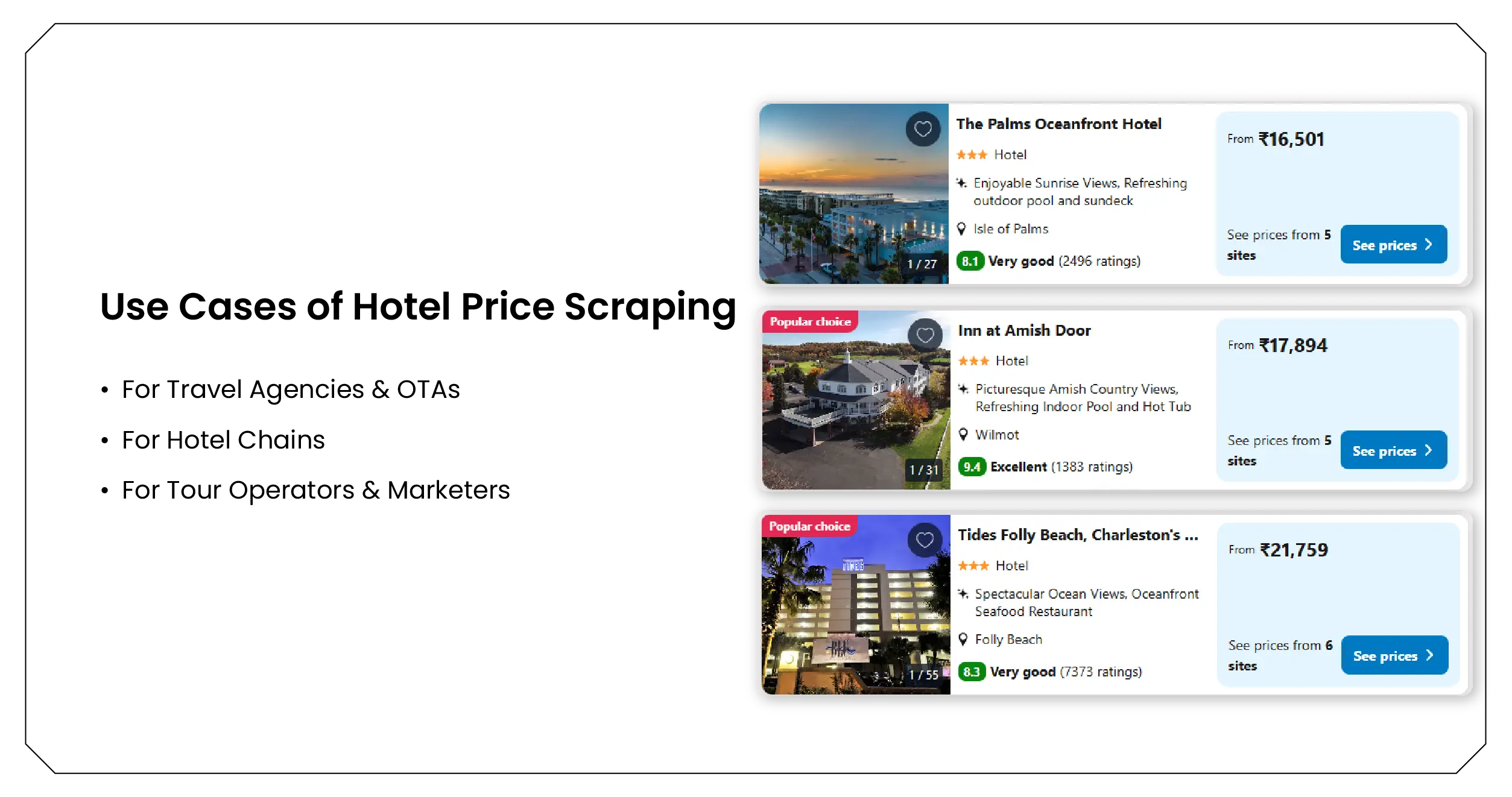Comparing Hotel Prices Across U.S. Cities: Booking.com, Trivago, and Hotels.com Data Scraping

Introduction
The U.S. hotel industry is one of the most competitive travel markets in the world, with thousands of hotels across cities like New York, Los Angeles, Chicago, Miami, Las Vegas, and San Francisco competing for bookings. With so many players in the market, travelers often turn to online booking platforms such as Booking.com, Trivago, and Hotels.com to compare rates and find the best deals.
But here’s the catch: prices fluctuate daily — sometimes even hourly — depending on demand, seasonality, competitor rates, and events. For travel agencies, hotel chains, and tourism platforms, relying on manual research is no longer enough.
This is where data scraping becomes critical. At Travel Scrape, we specialize in scraping hotel price data from platforms like Booking.com, Trivago, and Hotels.com, allowing businesses to analyze market trends, compare prices across U.S. cities, and make smarter, data-driven decisions.
In this blog, we’ll cover:
- Why hotel price scraping is essential for U.S. travel businesses
- What data points can be extracted from Booking.com, Trivago, and Hotels.com
- Sample datasets showing hotel price comparisons across major U.S. cities
- How Travel Scrape helps travel companies and hotels use this data
- The future of hotel price intelligence
Why Scraping Hotel Price Data Matters in the U.S. Market

The U.S. is home to some of the most dynamic hotel markets globally:
- New York City: Luxury-driven, high-demand, fluctuating rates based on events.
- Las Vegas: Dominated by resorts & casinos, competitive package pricing.
- Miami: Seasonal demand peaks for winter and spring break travelers.
- Los Angeles: Mix of budget and luxury, high competition among brands.
- Chicago & San Francisco: Business travel + tourism-driven demand.
Without real-time price intelligence, hotels and agencies risk:
- Losing customers to cheaper competitors
- Offering uncompetitive deals
- Missing out on peak demand opportunities
Data scraping ensures businesses have live, accurate insights into hotel pricing trends across the U.S.
Key Data Points Extracted with Hotel Price Scraping

Using scraping techniques, Travel Scrape can extract structured datasets from platforms like Booking.com, Trivago, and Hotels.com. These typically include:
- Hotel Name & Location
- Room Prices (per night, per stay, package offers)
- Date & Duration of Stay
- Hotel Star Rating
- Customer Review Scores & Ratings
- Amenities & Facilities (Wi-Fi, pool, breakfast, parking)
- Competitor Price Comparison (same hotel across multiple sites)
- Discounts, Promo Codes, Last-Minute Offers
This data allows travel businesses to compare cities, identify trends, and optimize marketing strategies.
Sample Data Example – Hotel Price Comparison
Below is a sample dataset (scraped & structured by Travel Scrape) showing average nightly hotel prices across key U.S. cities for mid-range 4-star hotels (synthetic example for illustration).
| City | Avg Price (Booking.com) | Avg Price (Trivago) | Avg Price (Hotels.com) | Review Score (avg) | Common Discounts |
|---|---|---|---|---|---|
| New York | $245 | $238 | $242 | 8.2/10 | 10% weekday deals |
| Los Angeles | $198 | $202 | $195 | 8.0/10 | Free breakfast offers |
| Miami | $215 | $210 | $218 | 8.3/10 | 15% seasonal discounts |
| Las Vegas | $160 | $155 | $162 | 8.5/10 | Resort + package bundles |
| Chicago | $185 | $188 | $183 | 8.1/10 | Loyalty rewards |
| San Francisco | $230 | $225 | $228 | 8.4/10 | Weekend promo codes |
Insights:
Use Cases of Hotel Price Scraping

- Las Vegas remains the most affordable among the six cities due to high hotel supply and package deals.
- New York and San Francisco rank as the most expensive, driven by demand from both leisure and business travelers.
- Miami sees seasonal promotions that heavily influence pricing trends.
1. For Travel Agencies & OTAs
- Compare competitor pricing in real-time
- Offer dynamic pricing to customers
- Create bundled packages with flights & hotels
2. For Hotel Chains
- Benchmark competitor properties in the same city
- Adjust prices dynamically to increase occupancy
- Track reviews and customer sentiment
3. For Tour Operators & Marketers
- Identify the best seasonal discount opportunities
- Target customers with city-specific deals
- Analyze which platforms (Booking, Trivago, Hotels.com) offer the most competitive rates
Technical Challenges in Scraping Hotel Sites
Scraping platforms like Booking.com, Trivago, and Hotels.com is not always straightforward. Challenges include:
- Dynamic Content – many prices load via JavaScript, requiring smart scraping techniques.
- Frequent Price Changes – prices update rapidly, requiring near real-time scraping.
- Anti-Bot Protection – CAPTCHA, IP blocking, and rate limits.
- Large-Scale Data – handling millions of listings across U.S. cities.
At Travel Scrape, we handle these with:
- Rotating proxies & residential IPs
- CAPTCHA bypass methods
- Cloud-based scalable infrastructure
- Custom scripts tailored per platform
How Travel Scrape Delivers Hotel Price Intelligence
With Travel Scrape’s hotel data scraping services , businesses can:
- Access structured datasets via API or bulk files
- Track competitor pricing across U.S. cities in real-time
- Gain insights into demand fluctuations & seasonal trends
- Save time, reduce manual effort, and stay ahead of competitors
We don’t just deliver data — we deliver actionable insights that help hotels and agencies maximize profits.
Sample Insight Visualization
Imagine scraping hotel data for a single week in June 2025. Travel Scrape can generate insights like:
- Budget Hotels (< $150) dominate Las Vegas and Miami.
- Luxury Hotels (> $300) dominate New York and San Francisco.
- Booking.com offers slightly cheaper NYC rates.
- Trivago performs best for LA hotel comparisons.
- Hotels.com provides the most frequent loyalty rewards in Chicago.
- Summer prices spike by 20–25% in Miami and Las Vegas.
- Winter discounts dominate Chicago due to off-peak demand.
Price Range Analysis
Booking Platform Advantage
Seasonal Impact
The Future of Hotel Data Scraping
As AI and big data evolve, hotel scraping will move beyond just pricing. Future applications will include:
- Predictive pricing models based on past trends
- AI-powered customer review sentiment analysis
- Automated package recommendations (hotel + flights)
- Competitor intelligence dashboards for hotels
Businesses that embrace scraping today will have the competitive edge tomorrow.
Conclusion
The U.S. hotel industry is incredibly competitive, and winning requires more than just good service — it requires data intelligence. By scraping Booking.com, Trivago, and Hotels.com, businesses can uncover pricing trends, competitor strategies, and customer insights that drive smarter decisions.
At Travel Scrape, we help travel agencies, hotel chains, and tourism platforms unlock the full power of hotel data scraping. Whether you need real-time competitor monitoring, seasonal trend analysis, or customized price tracking, we’ve got you covered.
Travel Scrape: Turning Hotel Data into Business Advantage.